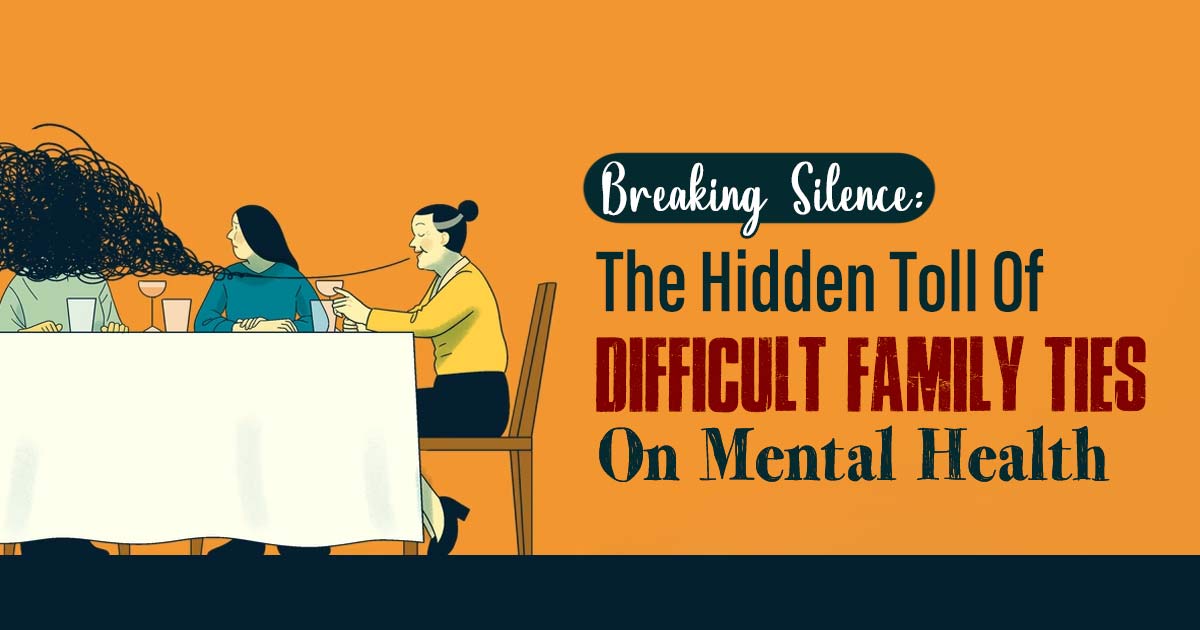Family, often considered the cornerstone of one’s support system, can paradoxically be a source of significant stress and strain. Dealing with difficult family members is a complex challenge that can take a toll on one’s mental health.
Understanding Difficult Family Dynamics
Difficult family members can manifest in various forms, ranging from constant criticism and judgment to outright conflict and hostility. These dynamics may stem from unresolved past issues, personality clashes, or differing values and beliefs. It is crucial to recognize that these challenges are not unique, and many individuals grapple with similar issues within their families.
The Impact Of Dealing With Difficult Family Members On Mental Health
The repercussions of dealing with difficult family members can extend far beyond the immediate conflicts. Chronic exposure to negativity, stress, and tension can lead to a myriad of mental health issues. Anxiety, depression, and even physical health problems can result from prolonged exposure to toxic family dynamics. Understanding the impact on mental health is the first step towards developing effective coping mechanisms.
Establishing Boundaries While Dealing With Difficult Family Members
One of the key strategies for safeguarding mental health in the face of dealing with difficult family members is the establishment of clear and healthy boundaries. Setting limits on what you are willing to tolerate and communicating these boundaries assertively can create a protective barrier against toxic behavior. This might involve limiting the time spent with certain family members or diplomatically expressing your needs and expectations.
Effective Communication While Dealing With Difficult Family Members
Open and honest communication is a cornerstone of healthy relationships, even within families. However, communicating with difficult family members can be particularly challenging. It is essential to approach these conversations with empathy, active listening, and a willingness to understand differing perspectives. Using “I” statements instead of “you” statements can help express feelings without placing blame, fostering a more constructive dialogue.
Seeking Support While Dealing With Difficult Family Members
Dealing with difficult family members can be isolating, but it is crucial to remember that support systems exist beyond the family unit. Seeking support from friends, mentors, or mental health professionals can provide a valuable external perspective and a safe space to share your feelings. Support groups, either online or in person, can connect you with individuals facing similar challenges, creating a sense of community and understanding.
Self-care Practices While Dealing With Difficult Family Members
Amidst the turmoil of challenging family dynamics, prioritizing self-care becomes paramount. Engaging in activities that bring joy and relaxation, such as exercise, meditation, or hobbies, can serve as a therapeutic escape. Taking care of one’s physical and emotional well-being is not only a form of self-preservation but also equips individuals with the resilience needed to navigate familial challenges.
Cultivating Empathy While Dealing With Difficult Family Members
While it may be tempting to respond to difficult family members with defensiveness or aggression, cultivating empathy can be a transformative strategy. Trying to understand the underlying motivations or insecurities that drive their behavior can foster compassion. This doesn’t mean condoning toxic actions but rather recognizing that hurtful behaviors often stem from personal struggles and unmet needs.
Professional Guidance While Dealing With Difficult Family Members
In cases where family dynamics become overwhelmingly challenging, seeking professional guidance can be a vital step. Family therapists or counselors can provide a neutral and structured environment for addressing deep-seated issues. Professional intervention can facilitate communication, offer coping strategies, and guide the family towards healthier dynamics.
It is essential to set realistic expectations when dealing with difficult family members. Accepting that some individuals may not change or that resolution may not be immediate can alleviate the pressure to fix everything. Adjusting expectations allows individuals to focus on their own well-being and personal growth rather than getting entangled in unattainable goals.






















